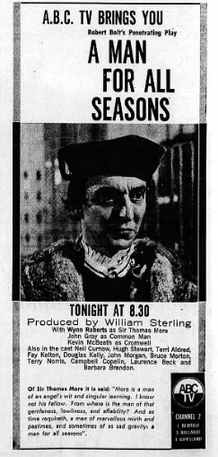| A Man for All Seasons | |
|---|---|
 Ad in The Age 16 Oct 1963 | |
| Based on | A Man for All Seasons 1960 play by Robert Bolt |
| Written by | Noel Robinson |
| Directed by | William Sterling |
| Starring | John Gray Wyn Roberts Neil Curnow |
| Music by | Robert Hughes |
| Country of origin | Australia |
| Original language | English |
| Production | |
| Producer | William Sterling |
| Running time | 90 mins [1] |
| Production company | ABC |
| Original release | |
| Network | ABC |
| Release | 16 October 1963 (Melbourne, live) [2] |
| Release | 15 January 1964 (Sydney, taping) [3] |
A Man for All Seasons is a 1964 Australian television play. It is an adaptation of the play by Robert Bolt. [4]
Contents
It was directed by William Sterling who thought the play was "the finest in construction and conception on the large heroic scale to come out of England since the War. Bolt has captured the seething historical background of the period as well as conceiving magnificent character studies of famous people of the time." [5]